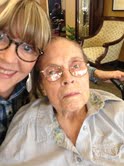 I made another 400-mile round trip yesterday, to visit my mother in the nursing home in Jackson, Mississippi. I’ve been making this drive about twice a month for the past four years. The years my mother has been in a nursing home. Before that, I visited monthly during the three years she spent in assisted living. Seven years of long-distance caregiving. In all those years she has only been in the hospital twice. This last time was a two-week stay, and I was at her side for eight of those days.
I made another 400-mile round trip yesterday, to visit my mother in the nursing home in Jackson, Mississippi. I’ve been making this drive about twice a month for the past four years. The years my mother has been in a nursing home. Before that, I visited monthly during the three years she spent in assisted living. Seven years of long-distance caregiving. In all those years she has only been in the hospital twice. This last time was a two-week stay, and I was at her side for eight of those days.
Close friends and family who know a bit about the verbal abuse I suffered from my mother for most of my life—especially my adolescent and young adult years, when she was drinking heavily—marvel at my attentive care. “You’re such an amazing daughter.” Like I have a choice? She’s my mother.
The mother I could never please for almost six decades no matter what I did. I could never be skinny enough, fashionable enough, or properly enough coiffed for her approval. And yet, here I am, angsting over every minute detail of her care, especially as the end of her life may be drawing near. I don’t want her to be anxious. Or in pain.
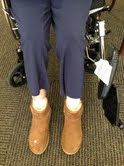 When I found her sitting in her wheelchair in the hall yesterday, a sigh of relief escaped my lungs. One of my fears as she returned to the nursing home in such a diminished state a week ago was that she might end up bed ridden. And I know this could still be her fate if she lingers in Alzheimer’s Hell for many more weeks, months, or years. But there she was—dressed, hair brushed and braided, and her bed made up and room neat and clean. The only problem was that one of the foot holders they had added to her wheelchair was broken, and her foot wouldn’t stay on it as I wheeled her up to the lobby for a visit.
When I found her sitting in her wheelchair in the hall yesterday, a sigh of relief escaped my lungs. One of my fears as she returned to the nursing home in such a diminished state a week ago was that she might end up bed ridden. And I know this could still be her fate if she lingers in Alzheimer’s Hell for many more weeks, months, or years. But there she was—dressed, hair brushed and braided, and her bed made up and room neat and clean. The only problem was that one of the foot holders they had added to her wheelchair was broken, and her foot wouldn’t stay on it as I wheeled her up to the lobby for a visit.
A physical therapist came by and I flagged her down and addressed the problem. She went off in search of a new piece for the chair, saying that this one was broken. Thirty minutes later I found her in physical therapy, busy with another patient, and reminded her. Another therapist promised me they would fix it soon.
“Is the speech pathologist here today? I want to talk with her about what’s going on with Mom’s oral feeding. The nurse told me they aren’t allowed to feed Mom yet due to her risk of aspirating.”
“Not today. Call her tomorrow, okay?”
It’s not perfect in this institution where Mom is spending the final years of her life. But it wasn’t perfect in the home she made for me as a child, either. Ouch. Did that sound spiteful? Would I have found a way to care for her in my home if she had been a different mother to me? I’ve asked myself that many times in recent years. There isn’t a clear answer. Life is often like that—messy, and unclear.
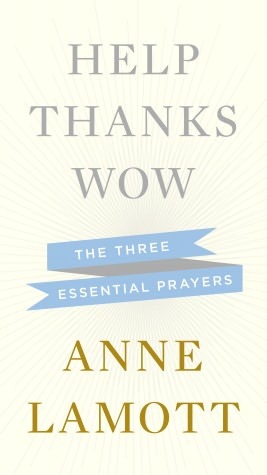 This morning I read some more of Anne Lamott’s wonderful little book, Help, Thanks, Wow: The Three Essential Prayers. Again, I found comfort and a bit of enlightenment in her words. Not because they are especially brilliant from a spiritual or psychological point of view (although I do believe she’s pretty smart and she’s learned a lot from what she’s been through) but I think more so because of the beauty of her words. It’s art. And it soothes and nourishes my soul. And yes, sometimes she helps me find God in the suffering.
This morning I read some more of Anne Lamott’s wonderful little book, Help, Thanks, Wow: The Three Essential Prayers. Again, I found comfort and a bit of enlightenment in her words. Not because they are especially brilliant from a spiritual or psychological point of view (although I do believe she’s pretty smart and she’s learned a lot from what she’s been through) but I think more so because of the beauty of her words. It’s art. And it soothes and nourishes my soul. And yes, sometimes she helps me find God in the suffering.
“We find God in our human lives, and that includes the suffering.…. We visit those shut-ins whom a higher power seems to have entrusted to our care—various relatives, often aging and possibly annoying, or stricken friends from our church communities, people in jails or mental institutions who might be related to us…. My personal belief is that God… has a certain kind of desperate person in Her care, and assigns that person to some screwed-up soul like you or me, and makes it hard for us to ignore that person’s suffering, so we show up even when it is extremely inconvenient or just awful to be there.”
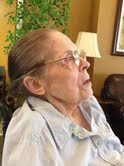 I know that part of Mom’s suffering is for my salvation. I hate it, but it’s true. I began to forgive her a few years ago, and I keep finding little reminders that God’s grace continues to heal me through these difficult times with her now. It seems to be too late to receive anything more from her—she can barely talk now, and doesn’t follow my image when I move even a few inches to the left or right of her vision. Only when I’m a few inches from her face does she respond, and then only with one word, “Hi.” Nothing more, no matter what words I say. After two hours of this yesterday, I found myself saying, “Mom, are you in there? If you can understand this, I just want to say that I forgive you. And I hope you forgive me. I love you.” And in the midst of this I find myself praying. Yes. I think I’ve prayed more in the past few weeks of Mom’s decline than in the past year or more. Pain seems to awaken even my messed up soul to prayer. Lamott nails it again:
I know that part of Mom’s suffering is for my salvation. I hate it, but it’s true. I began to forgive her a few years ago, and I keep finding little reminders that God’s grace continues to heal me through these difficult times with her now. It seems to be too late to receive anything more from her—she can barely talk now, and doesn’t follow my image when I move even a few inches to the left or right of her vision. Only when I’m a few inches from her face does she respond, and then only with one word, “Hi.” Nothing more, no matter what words I say. After two hours of this yesterday, I found myself saying, “Mom, are you in there? If you can understand this, I just want to say that I forgive you. And I hope you forgive me. I love you.” And in the midst of this I find myself praying. Yes. I think I’ve prayed more in the past few weeks of Mom’s decline than in the past year or more. Pain seems to awaken even my messed up soul to prayer. Lamott nails it again:
“Domestic pain can be searing, and it is usually what does us in. It’s almost indigestible: death, divorce, old age, drugs; brain-damaged children, violence, senility, unfaithfulness…. But grace can be the experience of a second wind…. For us to acknowledge that we have been set free from toxic dependency, from crippling obsession or guilt, that we have been graced with the ability finally to forgive someone, is just plain astonishing.”
And so I find myself embracing Lamott’s second of the three essential prayers: Thanks.
She says that if we are lucky, gratitude becomes a habit:
“You say ‘Thank you’ when something scary has happened in your beloved and screwed-up family and you all came through (or most of you did), and you have found love in the intergenerational ruins (maybe a lot of love or maybe just enough). Or you can look at what was revealed in the latest mess, and you say thanks for the revelation, because it shows you some truth you needed to know, and that can be so rare in our families.”
Love in the intergenerational ruins. I’m headed to Denver again tomorrow, to spend a week with my daughter. And her daughter. She and her husband are moving to a new apartment and I’m going to help with Gabby and whatever else she needs from me. It fills me with hope to watch Beth with her daughter. She’s amazing—full of unselfish love and unrelenting attentiveness. And Gabby is beyond amazing. A child kissed by the angels with physical beauty and intelligence and strength and a quiet and happy spirit. I think she may be God’s gift to my daughter, who endured abandonment by her birth mother when she was just over a year old, and then suffered my overbearing ways and lots of craziness during much of her childhood in the very imperfect home into which she was adopted.
Again, Lamott’s words say what I’m feeling:
“But if you’ve been around for a while, you know that much of the time, if you are patient and are paying attention, you will see that God will restore what the locusts have taken away.”
I will be 62 in March, so maybe that counts for being around for a while. I’m definitely seeing God restore what the locusts ate. And more and more, I’m able to pray, “Thanks.”
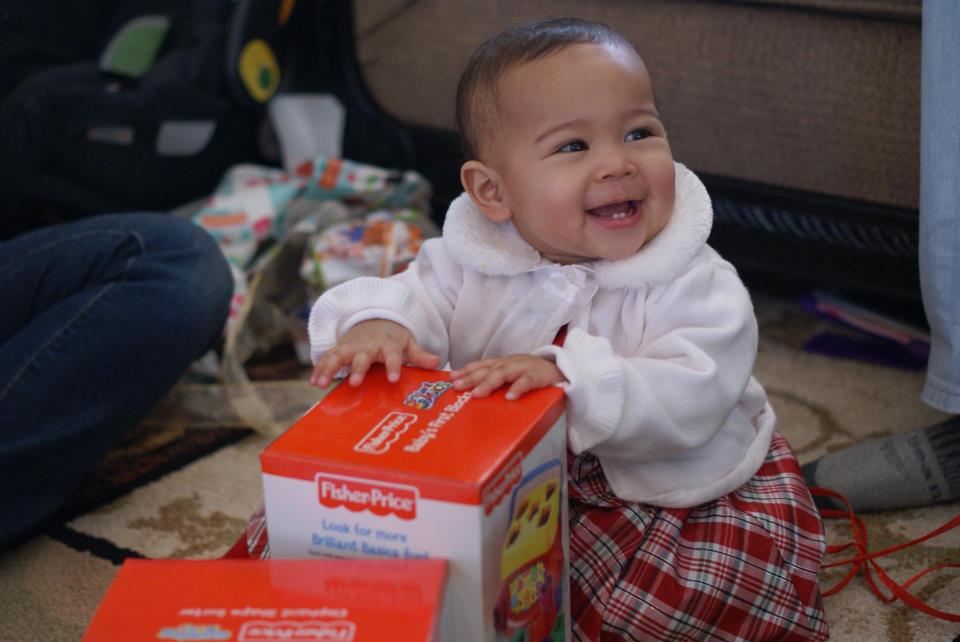
Very well written and inspiring for your readers…
I’m losing my mom to this dreadful disease also…She is in Baton Rouge and I am in Arkansas…
I had a few problems in my childhood with my dad. He was a very strict parent and I was afraid of him when I was young…Now, I have so much love for him and miss him terribly since he died 5 yrs. ago…I think of him everyday and talk to him with so much hurt in my heart…Hurt, because I didn’t get to see him before he passed…I was in a mad rush to get to him…He was in Pittsburgh and I got there the evening before he died…I was going to see him the next day….I will always have that desperate feeling of not being able to hold him one more time and tell him I forgive him too….I hope he knew I loved him and I always will wonder about that….I would tell him I loved him but never hugging him at the same time..You are so fortunate to be able to do that..So do it often ..
My mom is an angel with Dementia and I am desperately holding on to her and getting to do what I couldn’t with my dad…
Love hearing about you and your mom…God bless you both!
Mary Eckert
Isn’t it crazy that we didn’t really know anything about each other’s families in high school? If you’re ever coming my way – to Memphis or to Jackson – please let me know. I’d love to see you, Mary. Thanks so much for reading and leaving me such insightful comments.
My friend (dementia) has been moved to Georgia by her daughter. The father (also in the facility) is saying such terrible things to the daughter and she calls me. I told her when my dad was in psychiatric ward for attempted suicide they told me “the patient always lashes out on the one he/she feels the safest with.” My dad told me on the night I eloped (age 18 – husband 20). “You made your bed now you lie in it” and I’m supposed to forget. Such is your case. You cannot forgive in your own strength but together with your faith you can…………
Thanks, Martha.
A beautiful post. I can relate to this so much as I struggle to deal with an elderly mother with health problems with whom I have a difficult relationship. I am still working on forgiveness, and it helps to read your words and know that it’s a process and not necessarily an instant feeling.
Definitely not an instant feeling, Tina. Really, not a feeling at all, but rather a decision. You have to decide to forgive. If good feelings come, that’s just icing. Thanks so much for reading and commenting. We’re all in this together and it helps to hear from others.
Thank you Susan. We suffer, we survive, we forgive, we love, and we never forget. Peace.
Thanks, Emma…. lots of layers here, and I know you understand them.
Susan, I am just reading this (a little late, sorry) and I feel like this is a wonderful honest look at your journey with your mother. “I know that part of Mom’s suffering is for my salvation. I hate it, but it’s true.” That is so powerful. I will pray for you on your journey through grace and healing. This post is especially encouraging to me personally, as well – I’ve had some experiences that would probably count as “intergenerational ruins” and you’ve given me a new perspective on them.
Thanks for reading, Karissa. As a writer, I wish I had come up with Lamott’s words, “intergenerational ruin”…. don’t you? I always appreciate your comments.